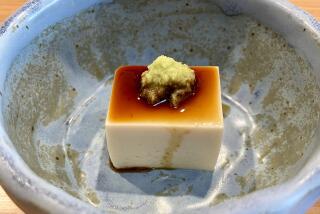A mushroom not to be missed
- Share via
MATSUTAKE mushrooms are to Japanese connoisseurs what white truffles are to Italians, but with one important difference -- you can buy them at grocery stores in Southern California.
One of the glories of fall dining in Japan, matsutakes are in season now. And though they are pricey -- $50 a pound -- they’re a bargain compared with truffles. Besides, mushrooms weigh so little that a quarter-pound is plenty for a feast for two.
Traditionally, matsutakes are prepared very simply to better appreciate their complex flavor: an intriguing combination of cinnamon, resin and Brie (or, as one notable fungiphile describes it, “Red Hots and gym socks” -- in a good way, of course).
Perhaps the easiest way to fix them is by simply cutting the mushrooms in half, brushing them with oil and cooking them on a stovetop grill.
Another popular way to cook matsutakes is to moisten them with sake, wrap them in foil and grill them. They can also be added to rice dishes and soups.
Raw, the mushroom is denser and tougher than you may expect. It softens with cooking but remains slightly chewy. Real cognoscenti insist that to preserve the aroma, you must tear apart the mushrooms with your fingers after cooking, rather than cutting them with a knife. Based on only a couple of tries, we couldn’t tell the difference.
The matsutakes that we get come from North America and are slightly different than the Japanese. (Ours is Armillaria ponderosa, theirs A. matsutake; the Japanese mushrooms are slightly darker, but the flavor is the same.) These are true wild mushrooms -- harvested in Western pine forests, starting in Northern California and proceeding with the fall into the Pacific Northwest and Canada. The season runs from late August until the first winter rains, usually in mid-November.
Because of the last couple of years of drought in the Northwest, matsutakes have been scarce this season, says David West, who occasionally sells them at the Wednesday Santa Monica and Sunday Hollywood farmers markets. He says one usually prolific area that normally accounts for 2,000 pounds of matsutakes a day is running only about 200 pounds this year.
Still, a spokesman for Marukai, a chain of markets that carries matsutakes, says the company hasn’t noticed any supply problems, and indeed there were dozens of plastic-wrapped packages of matsutakes available on a recent visit to one of the stores.
Marukai markets: 1740 W. Artesia Blvd., Gardena, (310) 660-6300; 123 S. Onizuka St., No. 101, Los Angeles, (213) 893-7200; 1420 S. Azusa Ave., West Covina, (626) 430-0900; 2975 Harbor Blvd., Costa Mesa, (714) 751-8433.
Mitsuwa markets: 21515 Western Ave., Torrance, (310) 782-0335; 665 Paularino Ave., Costa Mesa, (714) 557-6699; 333 S. Alameda St., Los Angeles, (213) 687-6699; 515 W. Las Tunas Drive, San Gabriel, (626) 457-2899; 3760 Centinela Ave., Los Angeles, (310) 398-2113.
*
Grilled matsutake mushrooms
Total time: 15 minutes
Servings: 4
Note: Matsutakes are available at Marukai, Mitsuwa and other Japanese supermarkets.
1/2 pound matsutake
mushrooms
2 tablespoons sake
Fleur de sel
1. Wipe the mushrooms with a damp cloth to remove dirt. Trim the stems to remove any moldy tips. Cut the matsutakes in half lengthwise. Place them on a square of aluminum foil.
2. Brush the matsutakes with the sake. Fold the foil into a tightly sealed packet.
3. Heat a grill pan or a grill until very hot. Place the packet on the hot grill and cook for 5 minutes. Turn the packet over and grill 5 minutes more.
4. Open the foil carefully, as there will be steam from the packet. Sprinkle with fleur de sel to taste and serve immediately.
Each serving: 22 calories; 2 grams protein; 2 grams carbohydrates; 1 gram fiber; 0 fat; 0 saturated fat; 0 cholesterol; 2 mg. sodium.
More to Read
Eat your way across L.A.
Get our weekly Tasting Notes newsletter for reviews, news and more.
You may occasionally receive promotional content from the Los Angeles Times.










